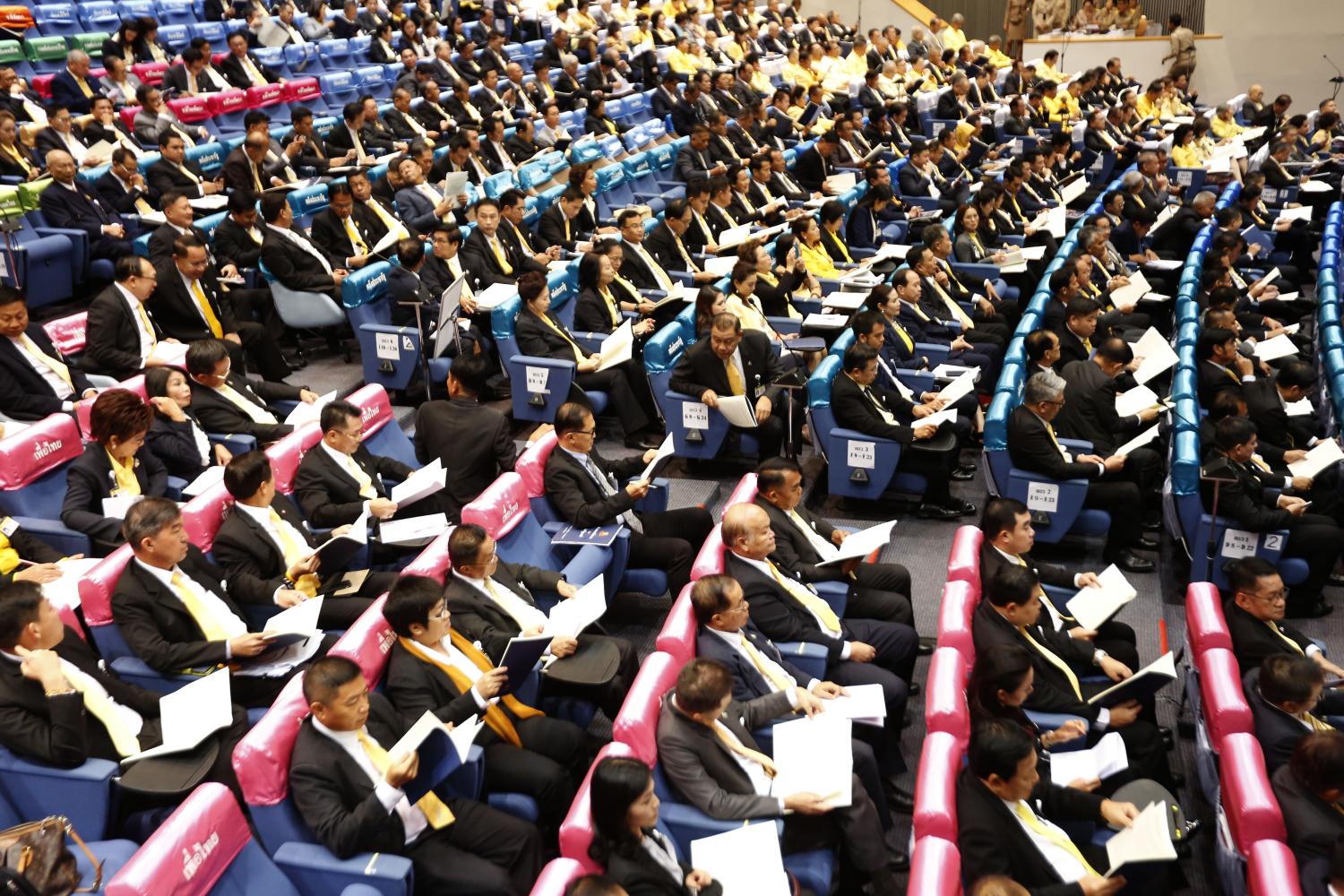
After a five-year hiatus, parliamentary politics returns this week with a constitutionally mandated policy statement by the coalition government of Prime Minister Prayut Chan-o-cha. With government and opposition back at work again, in contrast to the previous military-appointed rubber-stamp legislature under junta rule, Thailand has yet another small window of opportunity to regain and rebuild popular rule.
This time, the road will be long and daunting but the unpalatable alternative is more military authoritarianism. So parliament somehow must work as a chamber of people's representatives for legislation and decision-making that affects the collective good. If it does not, extra-parliamentary outcomes will certainly be undemocratic and likely autocratic. The reactivation of a partially elected parliament more than three months after the March 24 poll places Thai politics as a hybrid regime, neither fully authoritarian underpinned by a military junta, nor democratic based on the constitutional stipulation that sovereignty belongs to the Thai people. Instead, what we now have in Thailand is what political scientists sometimes refer to as a "competitive authoritarian" system. It combines elements of democracy and authoritarianism, where multiparty elections are held but do not necessarily lead to a genuinely democratic outcome.
Hybrid regimes are commonplace among developing countries. Cambodia, for example, can be seen as a "hegemonic electoral authoritarianism" because its main opposition party has been dissolved while elections last year returned the ruling party to power virtually unopposed. In the Thai case, the post-election authoritarianism is reinforced by the Senate and related agencies, such as the Constitutional Court, the anti-corruption commission, and the Election Commission. The Senate, which comprises one third of parliament, and these other agencies have all been appointed during the military government and are stacked with junta loyalists, firmly backed by Thailand's coup-prone army.
The 2017 constitution was thus set up to maintain authoritarian rule by allowing some multiparty competition through elections. This competitive authoritarian system is rationalised on maintaining political stability through legitimation, repression, and co-optation. The Prayut-led regime, for instance, now claims democratic legitimacy from the poll last March, while retaining military-style laws to search, arrest and detain people without due process. And fewer Thais in influential places are speaking up and speaking out than one might imagine because they have bought into the coup-installed apparatus.
Most vivid are the junta-appointed senators. All 250 of them voted Gen Prayut to be prime minister without exception. The individuals who run politicised agencies like the anti-corruption and election commissions are loyal to the incumbent regime by dint of their appointments. There are wide swathes of bureaucracy that have been rewarded and co-opted by the regime. The same goes for the state-enterprise sector and even sections of the private sector that have done well during junta rule. To be sure, supporters of the military-authoritarian regime also lurk in many other places, including the new and traditional media, civil society, and universities. They have vested interests in what the junta has done over more than five years.
The return of parliamentary politics with a viable opposition is thus critical. It provides a half chance for people who want to regain the kind of electoral democracy with open-society attributes that Thailand once had in the middle and late 1990s. The back-and-forth elections and coups so far in the 21st century have now culminated with this authoritarian rule in disguise under a Prayut-led coalition government of 19 parties.
Facing a razor-thin lower house majority, Prime Minister Prayut will be hard pressed to maintain such a rickety and unruly administration. When his political survival is at risk, such as when voting takes place on the budget bill or no-confidence motions, the prime minister may well have to resort to enticing opposition MPs to abstain or go along with the government, while doling out whatever it takes to keep coalition MPs from jumping ship. The process will likely appear unsavoury.
Another way to boost MP support is for a major member of the solid seven-member opposition bloc -- say, the Future Forward Party -- to somehow be dissolved. Its MPs would then be scattered and susceptible to poaching and enticements. This avenue would be a big risk for the government and its supporting agencies because a party like Future Forward has a substantial following who may not brook a blatant dissolution of their party without a fight. Dissolving an opposition party while leaving the governing coalition intact would also require double standards and naked manipulation that will be widely noticed. It is tough to call for patience when many are so pent-up with frustration and disaffection over the past five years of military government under a leader who is still leader after polls took place. Yet parliamentary politics in Thailand needs to be nurtured and gain the faith and trust of the electorate. In the past, elected parliaments too often became a circus of frivolous, unscrupulous, and shady politicians, eventually losing credibility and legitimacy in the public eye.
The best way for electoral democracy to come back at the expense of competitive authoritarianism is for the opposition to stick to professionalism, widen their constituency bases, strengthen their party structures and policy platforms, while allowing some time for the coalition government to repeatedly shoot itself in the foot with graft allegations, conflicts of interest, and abuses of power. This process may take longer than anticipated in view of the government's slim majority but it appears inexorable.
Thitinan Pongsudhirak, PhD, teaches at the Faculty of Political Science and directs the Institute of Security and International Studies at Chulalongkorn University.
